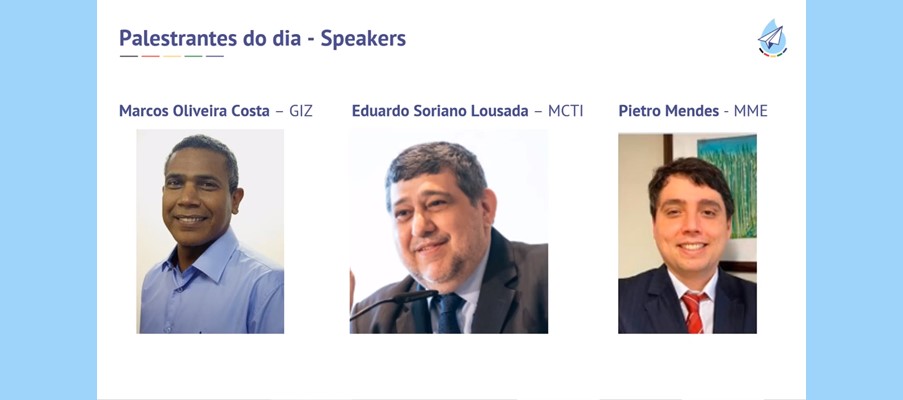Experts discussed the potential of the political moment for the development of sustainable aviation fuels in Brazil
Published on June 24, 2021
On a global scale, the implementation of increasingly comprehensive political, economic and regulatory measures towards the decarbonization of fuels and transportation can be observed. Brazil is a signatory to the Carbon Offsetting and Reduction Scheme for International Aviation (CORSIA), which imposes mandatory measures from 2027 to reduce emissions in international aviation. Therefore, the country will undoubtedly need to invest in the production of sustainable aviation kerosene and low carbon fuels in the future.
Aligned with this trend, the ProQR Project – Climate-neutral Alternative Fuels, on June 11, promoted the event “Clean Aviation for Brazil – Sustainable Fuels in the Brazilian Political Context”. In addition to speakers from relevant political bodies and the Technical Cooperation between Brazil and Germany (GIZ), the webinar brought together about 100 participants, members of various Brazilian and international institutions, including universities, companies and government organizations.
As speakers, Marcos Oliveira Costa (GIZ), Eduardo Soriano (MCTI) and Pietro Mendes (MME) presented extensively the current Brazilian scenario related to the development of sustainable fuels. In addition to disseminating the proposal of the ProQR Project, the ongoing national programs that encompass the theme, such as the Fuel of the Future Programme, were presented. There was a rich discussion about targets, synergies and challenges, very well received by the international public.
Marcos Oliveira Costa, deputy director of the ProQR Project and responsible for the project components Sector Articulation and Pilot Plants, presented one of ProQR’s proposals, that focuses on the modular production of fuels, involving Renewable Energies and the Fischer Tropsch technology, close to the place of fuel consumption. He also pointed out that:
“This is not the only route, and MCTI and ProQR also evaluate other ways to promote synthetic oil and synthesis gas.”
Among these, it is possible to produce the renewable hydrocarbon involving the technology of ambient air capture, biogas, ethanol, glycerin from biodiesel production, among others. Also in this line, the engineer Marcos Costa stated, that it is important to recognize the local vocations of the region where a plant will be installed to reach the best cost-benefit ratio of the enterprise.
Based on the mapping of refineries, waterways and fuel storage terminals in the country, the ProQR Project has found that, in remote locations in the northern region, the costs of carrying fuels represent a logistical problem. For this reason, the Project states that producing Power-to-Liquid Sustainable Aviation Fuel (PtL SAF) in these locations today is already economically viable.
Marcos also stressed the importance of the progressive development of certifications for these synthetic fuels at national and international level. With dialogues taking place at both levels, he stated that:
“At some point soon we will have the necessary conditions for this production to begin.”
Eduardo Soriano Lousada, Director of the Department of Applied Technologies of the Ministry of Science, Technology and Innovations (MCTI), evaluated as promising what he called the “set of framework conditions of Brazil”:
“It is very important to say that there is a framework of strategic guidelines, plans and resolutions that allow us to provide a confident environment, both in terms of technological and business development, for this new area that are renewable fuels for aviation, whether of biological origin, synthetic or a mixture of the two.”
Among them, Soriano highlighted the National Science and Technology Strategy, the Renewable Energy Plan, the Biodiesel and RenovaBio Programmes, the Fuel of the Future Programme (MME), the Hydrogen Program (in preparation) and the National Energy Policy Council. Soriano also stated that this framework is able to give security to investors.
Pietro Mendes, Director of the Biofuels Department of the Ministry of Mines and Energy (MME), mentioned the importance of promoting the integration between the ProQR Project and the National Fuel of the Future Programme:
“One of the great pillars of the Fuel of the Future Programme is precisely that we can create these bridges and propose integration measures of different initiatives that already exist in other Ministries and have this articulation.”
Pietro described the Technical Committee that will be constituted within the Fuel of the Future Programme. The Committee will be subdivided into thematic axes, such as Otto Cycle, Diesel Cycle, ProBioCCS, BioQAV and Marine Fuels, with BioQAV being the subcommittee that integrates Sustainable Aviation Fuels (SAF). Still, Pietro raised the importance of integrating public policies and the concern of the analysis of the life cycle of the “well to the wheel” in all modes of transport. In this case, not only the efficiency of the engine but also mechanisms for assessing the carbon intensity involved in the production of biofuels are taken into account. Among these, mechanisms such as zero deforestation. Finally, he stated that:
“Our goal is to reduce greenhouse gas emissions and not to choose one or the other route. When you look at the emission reduction scenario, it’s very clear that we need Sustainable Aviation Fuel to be able to reduce emissions.”
After the presentations, a rich dialogue evolved. It has become clear that, although the economic competitiveness of SAFs is still very low, there will be no way back in the efforts of transport decarbonization. For now, more questions seem to be asked than answers given – a fact that invites us to keep active in exchange within the theme of sustainable fuels for clean aviation.
To learn more, the event can be watched in Portuguese and English on the GIZ Brasil Youtube channel.
Find below the presentations of the webinar:
- Presentation (portuguese) Marcos Costa (GIZ)
- Presentation (portuguese) Eduardo Soriano (MCTI)
- Presentation (portuguese) Pietro Mendes (MME)
To subscribe to the ProQR Newsletter, please email us at proqr@giz.de, Subject: Registration Newsletter.
